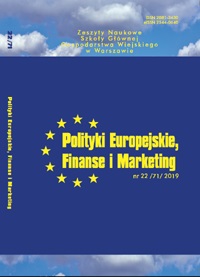Main Article Content
Article Details
Buabeng-Andoh, C. (2012). Factors influencing teachers’ adoption and integration of information and communication technology into teaching: A review of the literature. International Journal of Education and Development using ICT, 8(1).
Clark, JD (2007) Learning and Teaching in the Mobile Learning Environment of the Twenty-First Century. Austin, Texas: Austin Community College.
Digital learning 2020: A policy report for Kentucky’s digital future. Prepared in Partnership with OpenEdSolution. Retrieved from https://education.ky.gov/districts/tech/Documents/Digital%20Learning%202020%20-%20A%20Policy%20Report.pdf (10.12.2021)
Encyclpedia: https://www.encyclopedia.com/finance/finance-and-accounting-magazines/online-education
Garrison, DR, Kanuka, H (2004) Blended learning: Uncovering its transformative potential in higher education. The Internet and Higher Education 7(2): 95–105.
GUS, (2021a) Wybrane aspekty rynku pracy w Polsce. Aktywność ekonomiczna ludności przed i w czasie pandemii COVID-19, GUS, Recived from https://stat.gov.pl/files/gfx/portalinformacyjny/pl/defaultaktualnosci/5818/11/1/1/wybrane_aspekty_rynku_pracy_w_polsce_aktywnosc_ekonomiczna_ludnosci_przed_i_w_czasie_pandemii_covid-19.pdf (12.02.2022)
GUS (2021b) Społeczeństwo informacyjne w Polsce w 2021 roku, GUS Recived from: https://stat.gov.pl/obszary-tematyczne/nauka-i-technika-spoleczenstwo-informacyjne/spoleczenst wo-informacyjne/spoleczenstwo-informacyjne-w-polsce-w-2021-roku,1,15.html (01.02.2022)
HRDI Developmentinfo (n.d.) Developing content for E-learning. Retrieved from https://hrdevelop mentinfo.com/developing-content-for-e-learning/ (01.02.2022)
Kim, M. (2008). Processes of emotional experiences in online discussions: Emotional changes through interacting with other students. The Korean Journal of Educational Psychology, 22(4), 697-722.
Kumar Basak, S., Wotto, M., & Belanger, P. (2018). E-learning, M-learning and D-learning: Conceptual definition and comparative analysis. E-learning and Digital Media, 15(4), 191-216.
Papanis, E (2005) Traditional Teaching versus e-learning. Experimental Approach, Statistical Review 1(1): 19–35
Remote Learning. Taming the (Un)known Impact of COVID-19 on higher education https://www.delab.uw.edu.pl/wp-content/uploads/2021/01/ENG-Report_Remote-Learning-Taming-the-Unknown-Impact-of-COVID-19-on-higher-education.pdf (01.02.2022)
The Act of March 2, 2020 on special solutions related to the prevention, prevention and combating of COVID-19.
The Act of June 26, 1974, Labor Code.
Tomczyk, Ł., Walker, C. (2021) The emergency (crisis) e-learning as a challenge for teachers in Poland. Educ Inf Technol 26, 6847–6877. https://doi.org/10.1007/s10639-021-10539-7.
Trinder, J (2005) Mobile technologies and systems. Mobile learning: A handbook for educators and trainers. In: Kuklska-Hulme, A (ed.) Mobile Learning: A Handbook for Educators and Trainers. USA: Taylor & Francis, 7–24.
Tlambda, S. (2014). E-learning pedagogy part 2: The cognitive perspective. Viitattu, 26, 2019.
Vasilevska, D., Rivza, B., Pivac, T., Alekneviciene, V., & Parlinska, A. (2017). Analysis of the Demand for Distance Education at Eastern and Central European Higher Education Institutions. Journal of Teacher Education for Sustainability, 19(1), 106-116.
Wentling, T. L., Waight, C., Gallaher, J., La Fleur, J., Wang, C., & Kanfer, A. (2000). E-learning: A review of literature. Knowledge and Learning Systems Group NCSA, 9(1), 73.
Downloads
- Anna Milewska, Daniel Błażejczyk, Program „Rodzina 500+” szansą na rozwiązanie problemów polityki rodzinnej i demograficznej , Zeszyty Naukowe SGGW, Polityki Europejskie, Finanse i Marketing: Nr 27(76) (2022)
Możesz również Rozpocznij zaawansowane wyszukiwanie podobieństw dla tego artykułu.

Utwór dostępny jest na licencji Creative Commons Uznanie autorstwa – Użycie niekomercyjne 4.0 Międzynarodowe.





